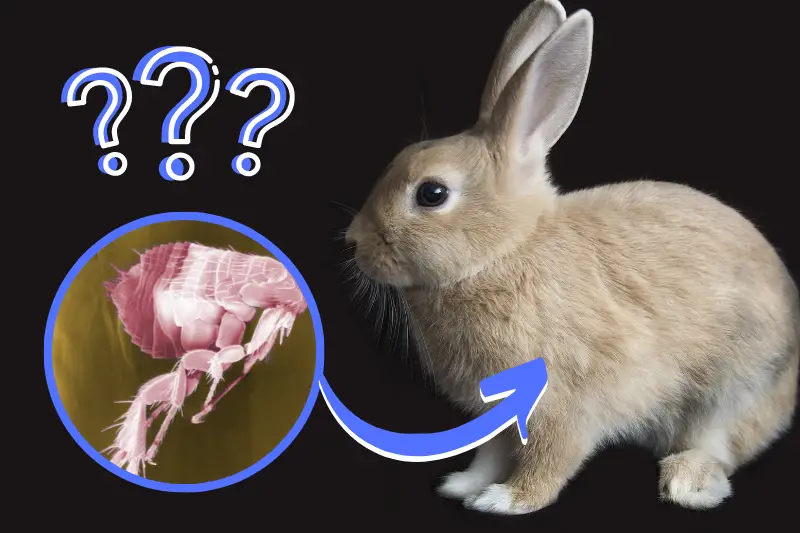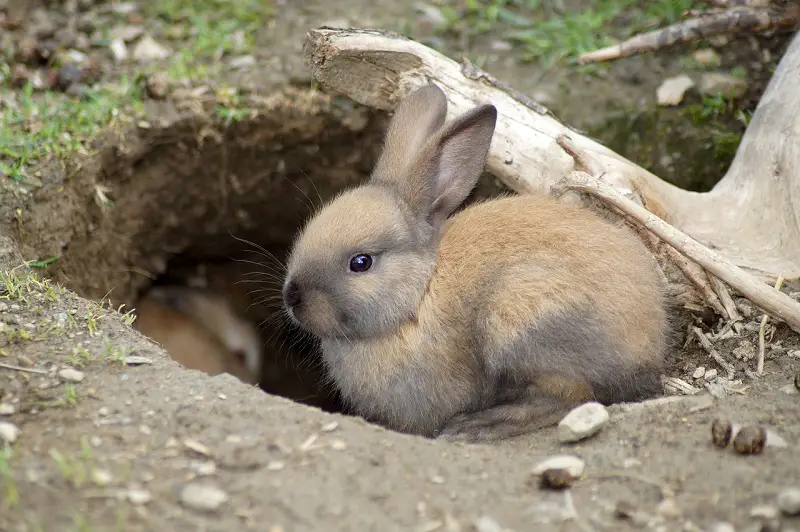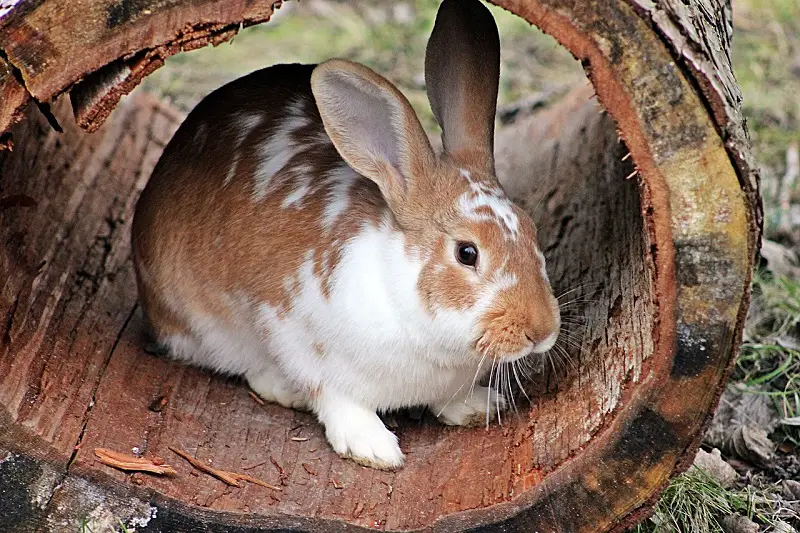Last Updated on June 12, 2023 by Laura Thompson
Furry mammals like rabbits are prone to getting fleas from time to time. This includes pets like cats, dogs, and rabbits. Flea infestation is more serious during hot weather seasons like spring and summer.
Fleas are tiny parasites that can jump over a hundred times their length. They can jump vertically up to 7 inches and horizontally up to 13 inches. They suck on blood from host animals and can move from host to host.
Rabbits do get fleas whether they live indoors or outdoors in a cage. They do not get fleas as much as other pets, but they do get them from other pets and their surroundings.
Here, we will look at how you can spot fleas, get rid of them, prevent them, and much more. Let’s get started.

Contents
How to Know if My Rabbit Has Fleas
If you are suspecting that your rabbit has fleas, here are some ways to find out:
Spotting fleas
Fleas are so small that you may not even notice them if they pass by. They are not easy to catch because they jump very quickly.
However, you may spot a tiny black bug in your pet’s fur or see it jump from them especially when petting them. If you actually see a flea, then that is a sign that there could be more hiding in your pet’s fur.
Itchy skin
If your bunny is restless and itching excessively, they could be having fleas. Fleas bite on their skin to suck blood and that will make your pet’s skin itch.
They will scratch on their bodies using their hind legs and nibble on their skin to try and get rid of the itch.
Flea bite marks
Flea bite marks look like red bumps on your pet’s skin. Gently stroke their fur to inspect their skin. Fleas leave bite marks and you will be able to see them.
Loss of fur
If your pet is having some bald spots that look like they are scaling with dandruff, that could be another sign of fleas.
Flea dirt
Flea dirt looks like tiny black particles on your pet’s fur. It is made up of flea poop and dried blood.
To be sure that it is flea dirt, get a damp paper towel or cotton wool and wipe it. If it turns reddish, then that is a sign of fleas.
Anemia
Fleas suck on the blood of their host animals. If your pet has many fleas, they will suck on their blood and leave them weak. If your pet looks lethargic and their gums look pale, those could be signs of anemia.
Seeing one or a combination of these signs in your pet could mean that they have fleas. However, some of these signs could be indications of a different condition.
If you are unsure about it, you can always consult a vet for a thorough check-up.
Where do Rabbits Get Fleas?

If you just noticed that your rabbit has fleas, you may be wondering where they got them from. Rabbits can get fleas from:
Outdoors
If your rabbit goes out a lot of the time, then it can easily get fleas. They can get them from infested surroundings like grass.
Other pets
If you keep other pets like dogs and they have fleas, they are likely to be transferred to your pet bunny. Interacting with neighborhood bunnies and pets with fleas will also give your rabbit fleas.
Untidy homes
If your home is untidy, it offers a perfect breeding place for fleas. They can lay eggs, grow in number, and hide in your rabbit’s fur. Visiting other homes with fleas will also give your pet fleas.
Can Fleas Kill Rabbits?
Fleas can transmit a serious condition called myxomatosis in rabbits. It’s a type of rabbit virus that is fatal almost all the time.
The good thing is that rabbits can be vaccinated against it to prevent infections.
Tips to Get Rid of Fleas on Rabbits
If your rabbit has fleas, you should get rid of them sooner rather than later. Aside from knowing how to clean rabbits properly, here are 5 tips to get rid of fleas on your rabbits:
1. Flea comb
A flea comb may not get rid of fleas permanently, but it still works. Brush the bunny’s hair gently and keep the teeth close to the skin while combing.
This gets the fleas stuck on the comb and you can take them out. Dip the comb in warm soapy water or alcohol to kill them. Remember to brush behind the ears and legs.
2. Rabbit Flea Treatment
Use safe flea treatments on your rabbit’s skin. A safe treatment is topical skin flea medication which does not need to be applied on the full body.
Use one that only needs to be applied on the bunny’s neck. This prevents them from licking it off their coat.
3. Other Pets Flea Treatment
If you have other pets in your home, treat them for fleas too. Most treatments may not be safe for rabbits, but they are safe for cats and dogs.
Treating them makes sure that their fleas will not jump on your rabbit after you treat them.
4. Disinfect hutch
Clean out the rabbit’s hutch after treating them. The hutch will have fleas because your rabbit spends most of its time there.
If the hutch is left untreated, the fleas will still get on your pet’s fur. Treat everything in the hutch and make sure that the treatment is safe for them.
5. Clean surroundings
If your pet lives indoors, you will have to clean up your whole house. Clean carpets, floors, furniture, and dark areas.
Fleas like being in the dark and they will lay eggs even on carpets. Vacuum the house and treat using powder treatment.
Leave the powder on for 30 minutes then clean it all up. Keep your pet away for 24 hours if you are using flea bombs and sprays which could affect them.
Don’t forget to treat the outdoors because young fleas can hide even in the grass.
Flea Treatment That is Unsafe for Rabbits

Some flea treatments are unsafe for rabbits and you should avoid using them on bunnies because of their toxicity.
Read the ingredients in the treatments before buying or consult a veterinarian for safe treatments.
Products with ingredients like fipronil, permethrin, and pyrethrin are toxic to bunnies. Avoid washing your pet with shampoos, sprays, powders, and dips.
These products have chemicals that are harmful to rabbits if they lick themselves while grooming.
Conclusion
A flea infestation is very irritating and your pet will become restless because they will itch all over. Keep your house clean at all times by vacuuming and steaming it frequently.
Groom your pet regularly to prevent fleas from living and breeding in their fur. If you are unsure of how to treat fleas, seek a vet’s help.
In case of a serious flea infestation in your home, you should call a professional right away.
Laura is an experienced wildlife rehabilitator and conservationist residing in Madison, Wisconsin. Her love for rabbits was sparked during her early career when she nursed an injured wild rabbit back to health. Today, she runs “Hoppy Haven”, a rehabilitation center dedicated to the care and release of injured wild rabbits.
